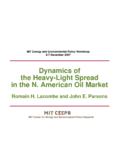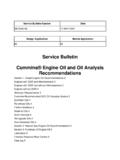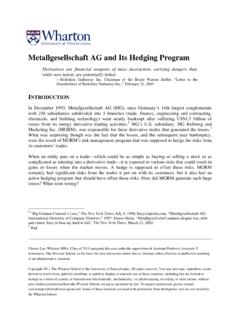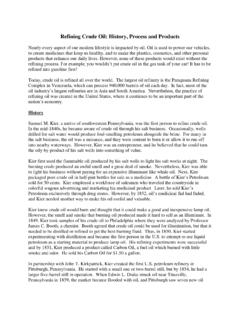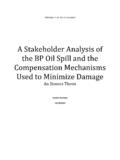Transcription of How the Oil Market Works (1) - Lipow Oil Associates
1 Lipow Oil Associates , LLC 2217 Robinhood Street, Houston, Texas 77005 713-524-7528 How the Oil Market Prices work -A Brief Explanation This report tries to explain how the oil Market Works in a simple and brief manner. However the reader should be aware that the oil Market is quite complex, no one statement can cover all the cases and instances of oil trading. With crude oil and gasoline prices rising to record levels in 2008 and the potential for new records to be set in the future, it is reasonable to assume that questions arise as to how crude and product prices are ultimately established.
2 Crude Oil Market Worldwide crude oil production is approximately 85 million barrels per day with just over 30 million barrels per day produced by OPEC member countries. Crude oil production in the United States is approximately million barrels per day. The US, with a population of 313 million, consumes about 19 million barrels per day of oil products. China, with a population of billion, consumes about one-half of that amount; roughly million barrels per day. A growth rate in US demand is currently equivalent to about a growth rate in Chinese oil demand.
3 Total world oil demand is over 89 million barrels per day. Crude oil quality varies significantly. There are hundreds of different types of crudes produced around the world. West Texas Intermediate (WTI) crude is low sulfur, approximately weight percent. Crudes from Nigeria have even lower sulfur of around weight percent or less. Meanwhile crude produced from Saudi Arabia has sulfur levels in excess of 2% while crude out of Iraq has a sulfur level of nearly 3%. This is but one aspect of quality.
4 Another aspect of quality is whether it is light or heavy. Light crude is easier to refine because it contains more material such as naphtha that can be refined into gasoline while also containing significant amounts of jet fuel and diesel fuel. Heavier crudes contain what is know as vacuum gas oil and residual fuel which must be further processed into lighter transportation fuels in several refining process units. Refiners then value each of these different crudes based on the yields of those products mentioned in the previous paragraph, the cost of refining into a finished product, and the ultimate value of those products.
5 The value of each is different to every refiner and the cost of these different types of crude varies. This naturally leads to the question How is the price of crude oil determined? There are three benchmark crudes in the world. Dubai is the benchmark for crude in the Middle East, Brent crude is the North Sea crude marker, and West Texas Intermediate (WTI) is the marker crude for Western Hemisphere crude oils. WTI, or light sweet crude is the crude one hears about daily. When you hear a crude oil price of $100 per barrel, or Lipow Oil Associates , LLC 2217 Robinhood Street, Houston, Texas 77005 713-524-7528 $70 per barrel, this is the crude that is being referred to.
6 What is not so clear is what this $100 per barrel means to the rest of the crude oil Market . Light Sweet crude oil contracts, also known as WTI is traded on the New York Mercantile Exchange Futures Market . When one hears a price, it refers to a specific quality WTI, for a specific timing, say March Delivery, at a specific location namely Cushing Oklahoma. Clearly one can see that this means nothing to a refiner in Philadelphia, Los Angeles, Brazil or Canada. Over the years, the NYMEX has allowed foreign crudes to be delivered against the contracts with a deemed quality differential.
7 This increases the liquidity of the contract. Every day hundreds of millions of barrels of WTI are traded, and at the end of the day a settlement price is announced. As mentioned before, each crude oil has distinctive qualities, and therefore it has a Market value higher or lower than that of WTI. The different types of crude oil bought and sold around the world are priced at discounts or premiums to the benchmark crudes. For example, Arab Heavy crude from Saudi Arabia, which is heavier and higher sulfur than WTI, is being offered by Aramco at a price of WTI minus about $3 per barrel loading in February 2012 at a port in Saudi Arabia.
8 Specifically, when you load your oil tanker, you create a bill of lading date, and the price is calculated based on the average of five trading days where one would take the NYMEX settlement price and subtract 3 dollars. The price of WTI can fluctuate on a daily basis, but in this example, the buyer would always pay 3 dollars less. This type of process is repeated throughout the trading world, although some Asian crudes price a bit differently. In addition, some domestic crude oils are priced on a posting basis, but these postings fluctuate daily with the NYMEX.
9 To reiterate: Crude oil is priced on a differential basis to the benchmark crudes. When the benchmark moves, the final purchase price moves. OPEC sets production rates that impact supply which in turn affects the price determined by the Market . That leads to the question, Who is setting the benchmark crude price? The answer is oil traders, refiners, producers, hedge funds, pension funds, speculators, doctors, lawyers and individuals who all are taking a position on NYMEX Crude. (A similar parallel can be drawn with Brent and to a lesser extent Dubai).
10 If the Market hears a story about a supply interruption in Nigerian oil supply, the Market is bid up. If the Market hears about potential sanctions on Iran, price is bid up. When inventories of crude oil and oil products rise, or demand goes down, the price falls. These moves affect the price of crude oil that has been purchased or sold by oil companies on a differential basis. When crude oil prices rise, oil producers around the world benefit. OPEC, state owned oil companies, and large integrated oil companies with oil reserves are the winners.
